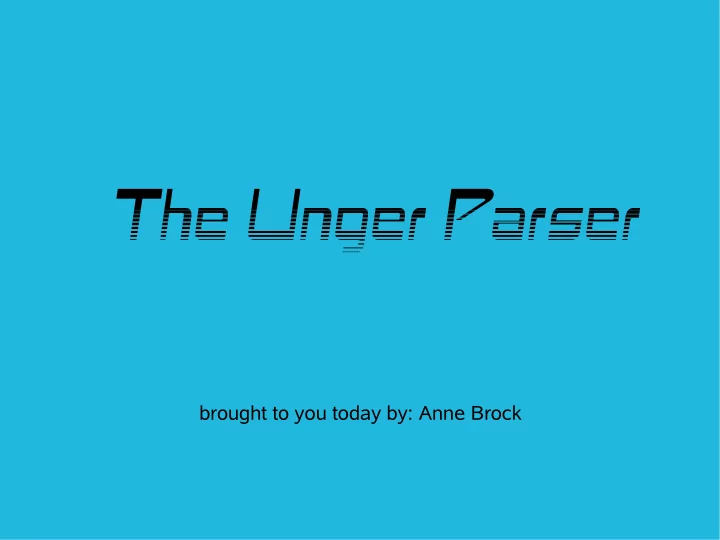

The Unger Parser brought to you today by: Anne Brock
Outline ● Unger - the man ● Unger - the parser ● Unger's method, simple version ● some improvements ● Unger's method, including ε - rules
1. Unger: The man Stephen H. Unger - Politechnic Institute of Brooklyn - doctorate at MIT - Bell Telephone Labs -research in digital systems -head of development group (first electronic telephone switching system) - since 1961: Prof. of Computer Science and Elec- trical Engeneering at Columbia University -1968: the Parser. -since: published several books.
2. The Parser ● non-directional ● top-down ● Type 2 grammars (CFG)
3. Unger's method, simplified Input: CFG and a String/sentence, for example: grammar: S > ABC | DE | F 'sentence': pqrs
Does S derive... ABC | DE | F ?
This is a search problem. Search: depth-first or breadth-first?
A more detailed example Grammar: E -> E + T | T E = Expression T = Term T -> T x F | F F = Factor F -> (E) | i +, x = operators i = operand Input: ( i + i ) x i
E -> E + T | T
E ->* ( i ? E -> E + T | T T -> T x F | F F -> (E) | i fails!
to derive: ( i + i ) x i E -> E + T | T - fails! (E -> E + T | T) T -> T x F | F T -> T x F | F F -> (E) | i F -> (E) | i - success!
E -> E + T | T T -> T x F | F F -> (E) | i
4. Room for improvement... - consider the actual terminal symbols - consider the length of your input
5. Unger's method with ε-rules S -> ABC B -> SD try and derive: B -> pqr
S -> ABC B -> SD ... What to do about it? -> Keep a list of currently considered questions!
An example. How does this grammar derive d ? dd ?
d ?
dd ?
S ->* d ? S -> LSD -> SD -> LSDD -> SDD -> DD -> dD -> dd.
Summary The Unger parser: - is a non-directional, top-down parser; - will consider each possible (and impossible) solution; - requires at least polynomial, if not exponential time; - is slightly improved by -matching input with possible derived terminals -calculating possible length, special case ε -remembering answers.
?
Sources Grune, Dick and Jacobs, Ceriel 1990. Parsing Techniques. A Practical Guide. New York: Ellis Horwood Limited. Lukasz Kwiatowski. Reconciling Unger's parser as a top-down parser for CF grammars for experimental purposes. http://www.cs.vu.nl/~steven/ pictures from: www.cs.columbia.edu/async/images/unger.jpg http://pinker.wjh.harvard.edu/photos/cambridge_boston/pages/trees%20in %20Cambridge%20Common.htm
Recommend
More recommend